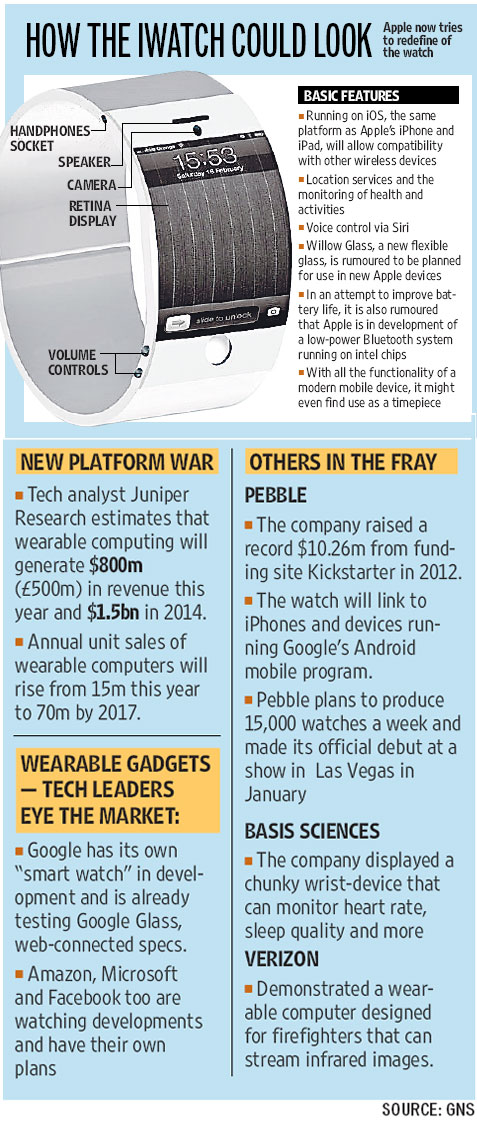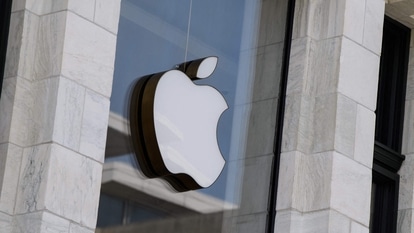Age of wearable tech is here
Apple, Google are just two of giants working on gadgets, including iWatch. The next phase of the techno revolution is hoving into clear view: welcome to the age of “wearable tech”, with a gadget available to cater to your every need. How the iwatch could look
Apple has already transformed two industries: music and computing. Now, as the company reportedly attempts the redefinition of the watch - one of man's oldest pieces of technology - the next phase of the techno revolution is hoving into clear view: welcome to the age of "wearable tech", with a gadget available to cater to your every need.
Wearable technology is hardly a new phenomenon. Conrad von Soest depicted an apostle in reading glasses in the Niederwildungen Altarpiece in 1403, and there are mentions of the use of eyeglasses dating back to antiquity. Watches have been in circulation since the 16th century.
And English inventor Alphonsus William Webster received what is believed to be the first patent for a hearing aid - a curved earpiece worn behind the ear - in 1836.


But thanks to the internet and Moore's Law - the theory that the number of transistors on a chip will double approximately every two years - a whole new world of possibilities is opening up, and with it comes a host of questions that look set to eclipse all previous debate over online privacy.
Inevitably nicknamed the iWatch, the Apple device, on which the company is characteristically not commenting, has the tech world in a frenzy of sci-fi speculation.
James Bond, Dick Tracy, Inspector Gadget - the techno watch has been a mainstay of fanboy fiction for generations. But the internet revolution seems to have largely bypassed the watch, until now.
Apple reportedly has 100 employees looking at the device that will take advantage of recent developments in hi-tech curved glass, cheaper sensors and better voice recognition software.
What will the iWatch do? Monitor your health? Act as a credit card? A wrist-bound GPS? Laser cannon and teleporter? We'll have to wait and see but to be honest if that's all it does, you may as well strap an iPhone to your arm.
Apple has a history of delivering surprises and the iWatch would be its first big new product since the death of founder Steve Jobs.
The company will want to make a splash. Especially as arch-rival Google has its own "smart watch" in development and is already testing Google Glass, web-connected specs. Amazon, Microsoft and Facebook too are watching developments and have their own plans.
Last year analyst Forrester issued a report describing wearable computing as "the new platform war".
Tech analyst Juniper Research estimates that wearable computing will generate $800m (£500m) in revenue this year and $1.5bn in 2014. Annual unit sales of wearable computers will rise from 15m this year to 70m by 2017.
Others have already blazed a trail for smart watches. Pebble, a smart watch company, raised a record $10.26m from funding site Kickstarter last year.
The watch will link to iPhones and devices running Google's Android mobile program, letting you know who is calling, taking text messages and showing emails. It will also run new apps, such as acting as a bike computer for cyclists.
Pebble plans to produce 15,000 watches a week and made its official debut at the Consumers Electronic Show in Las Vegas in January. This is the electronic industry's showcase and this year wearable tech was ubiquitous.
Alongside Pebble a company called Basis Sciences displayed a chunky wrist-device that can monitor heart rate, sleep quality and more.
An American football helmet with pressure pads inside promised to monitor players' health and any damage from tackles - increasingly a major issue in the sport.
Verizon demonstrated a wearable, wireless computer designed for firefighters that can stream regular and infrared images.
Nike has a hit on its hands with Fuel, a wristband that monitors your activity and acts like a personal trainer.
Tellingly, Apple boss Tim Cook wears one. Former Apple CEO John Sculley and business partner Sonny Vu have a new venture called Misfit Wearables that has developed an activity tracker that will send all your data to your favoured device.
Sculley has been mentoring healthcare experts in recent years, one of many Silicon Valley stars increasingly interested in the intersection between health and technology.
Governments around the world are pouring money into wearable tech. US soldiers in Afghanistan have been testing a device called the shoulder worn acoustic targeting system (SWATS), developed by British tech firm QinetiQ, that can pinpoint the exact location of gunfire and display it on a small screen attached to a soldier's body armour.
Devices are also being used to monitor soldiers' health, such as their hydration levels, and to augment their vision. Many of these technologies are likely to filter down to civilian life.
Sonny Vu says wearable technology appears poised to go mainstream. "It's still kind of limited in what it can do. And a lot of it looks unwearable. Google Glass makes you look so geeky," he says.
Google co-founder Sergey Brin was recently snapped on the New York subway wearing the glasses and looking like a tourist in town for the marathon. But geeky or not, Vu predicts that this year will see a major leap forward for wearable tech.
"It makes you look at technology in a different way. We are moving to a world where technology interacts with us - you are not just staring at a screen. It is suggesting things to you. Maybe go for a walk, or reminding you that you need to shop for food," he says.
According to Vu, a lot of the tech is uninteresting. But that will change.
Britain's Cambridge Temperature Concepts has developed a portable fertility monitor that can measure a woman's body temperature 20,000 times a day at a precision of a thousandth of a degree.
Apps are in development that will monitor for heart attacks and strokes - wearable tech could soon be like possessing a portable doctor.
Catch all the Latest Tech News, Mobile News, Laptop News, Gaming news, Wearables News , How To News, also keep up with us on Whatsapp channel,Twitter, Facebook, Google News, and Instagram. For our latest videos, subscribe to our YouTube channel.

























